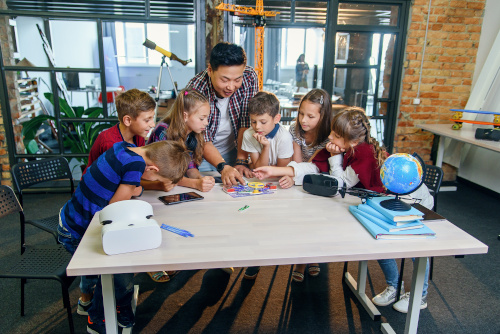One of the many reasons I love working for Van Andel Institute for Education is that I get to be a teacher Fairy Godmother. Teaching is an important but difficult job, and sometimes educators can get stuck on a specific need for their classroom. Maybe it’s finding the perfect resource for a lesson or connecting certain content to a project idea.
Whatever the situation calls for, my colleagues and I love to swoop in and help make their dreams a reality. But every Fairy Godmother needs a magic wand to work her wonders, and for my part, there’s no better resource to meet teacher needs than project-based learning.
What is project-based learning, anyway?
Let’s start with what project-based learning is not. PBL is not simply a fun and creative project you implement in class. Don’t get me wrong, having students participating in a fun, imaginative activity can be good, but it’s a bit like the “dessert” of learning. These activities can be sweet and easy but they’re not exactly nourishing. PBL is the main course—the discovery of knowledge and skills through the development of a meaningful, sustained project.
True project-based learning is recognized by characteristics like sustained inquiry, iterative thinking, and cross-curricular learning. Unlike a standard project, which is usually a one-and-done deal, PBL should build on itself.
Related:
5 tools that support project-based learning
Reflections on project-based learning
As students pursue their investigations, they should also be practicing social-emotional skills like communication and collaboration, and upon completion, they should know how to apply their learning to real-world problems. That’s what makes PBL so magical – you’re helping students acquire valuable knowledge that they can apply right now in their own community.
Examples of engaging PBL
One great model for authentic project-based learning is the Blue Apple unit, Take a Stand. In this project, students take a stand in support of a public policy issue that matters to them. They learn about all sides of several topics like education and the environment. Then, through respectful discourse, they construct and articulate well-researched positions on a topic of their choice through an inspirational podcast. One class even shared a video where you can see how students are engaged, driven, and practicing their critical thinking skills!
Not only does the PBL unit come with rich resources such as a book list and content standards (which are great for busy teachers), but it also provides a degree of flexibility you don’t find in standard lessons. Consider a student who struggles with literacy–a project like Take a Stand can help them grasp concepts like sequencing, summarization, and themes all through hands-on learning. The same is true for concepts in math or science. Students who are normally challenged in these areas will have the opportunity to approach them from a different angle. Not only does this help them overcome a learning block, but it’s done in a way that’s memorable, meaningful, and fun!
Getting started
I truly believe that now is the time to start implementing project-based learning in our classrooms. I feel the pandemic brought out a real craving for authenticity in our learning and relationships with one another. This new school year is a real opportunity to reimagine what teaching and learning can look like in our schools. If we approach things slowly and intentionally, we can change teaching and learning into what we got into this profession for it to look like. So, give project-based learning a try, and if you find yourself in need of a Fairy Godmother, please don’t hesitate to reach out!
- 4 ways to encourage play in education - April 25, 2024
- CoSN IT Leader Spotlight: Lisa Higgins - April 25, 2024
- It’s time to pay student teachers - April 25, 2024


